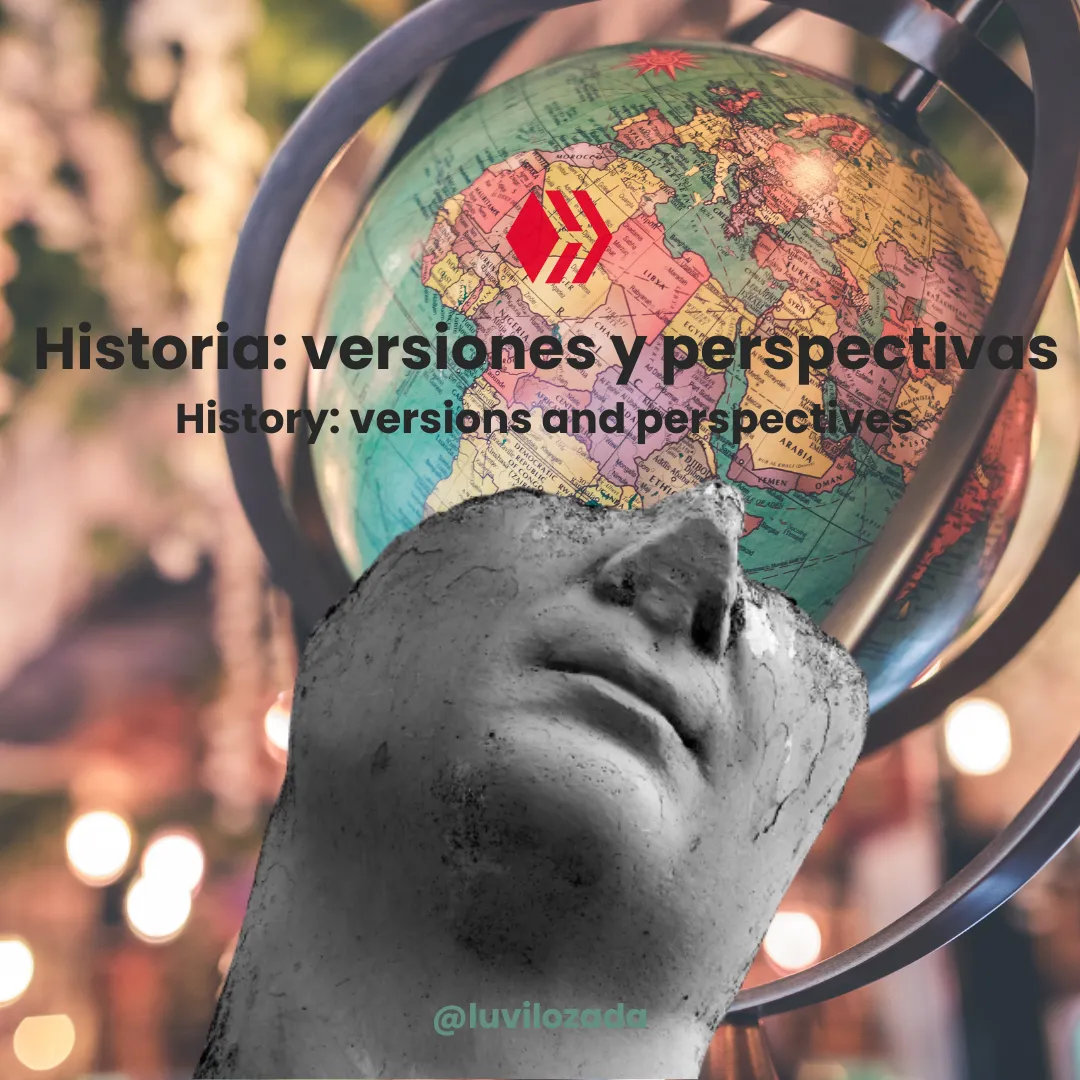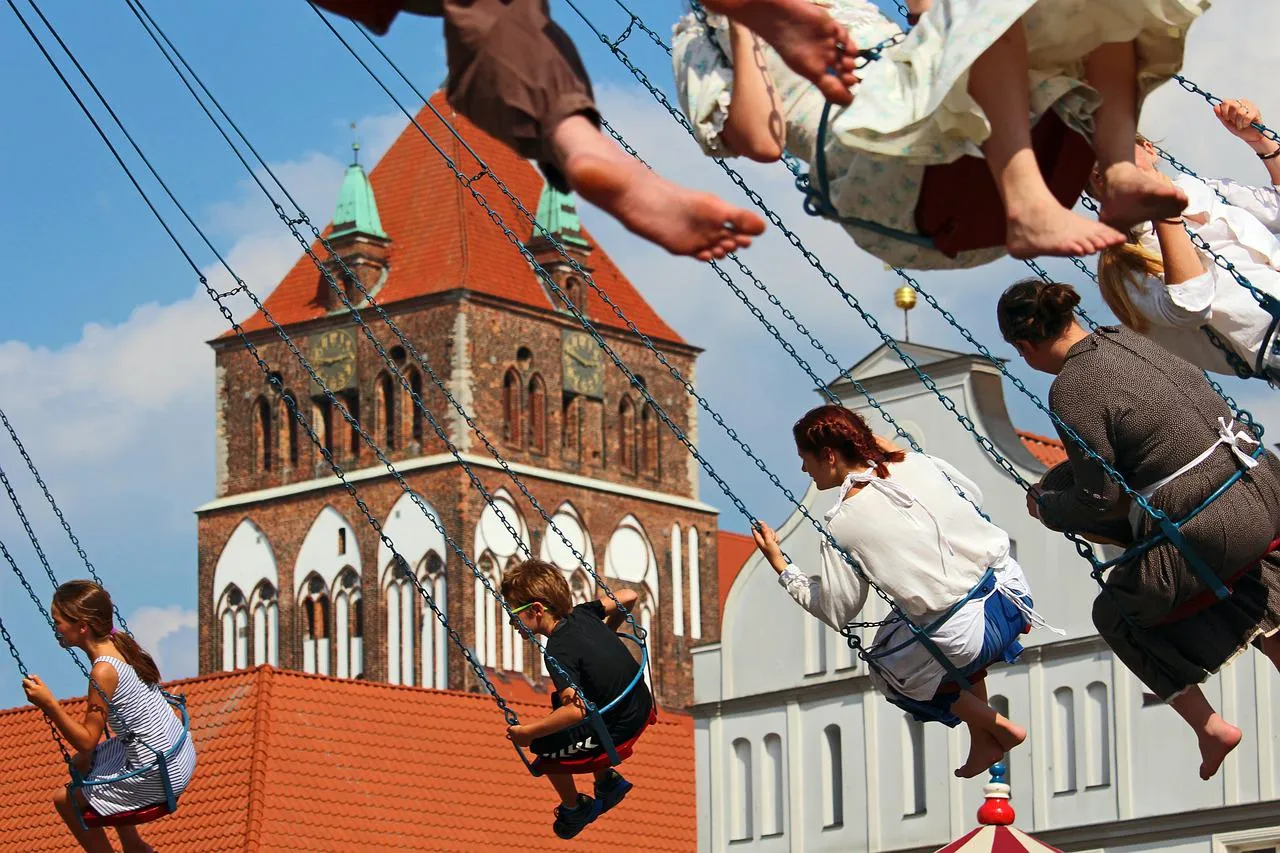
Fuente imagen/Source image
Edición e imagen de fondo en: Canva/Editing and background image in: Canva
Version español
Saludos, comunidad.
Hoy quiero contribuir con algunas reflexiones sobre la Iniciativa: Cultura Humana Semana 6: Historia, para quien desee conocer o participar en esta y otras convocatorias de #humanitas revisar aquí.
Comencemos
Para hablar de historia hago referencia a 3 momentos que considero importantes en mi vida:
Mis primeros acercamientos a la historia fue durante la escuela y el bachillerato, desde un efoque del conocimiento a la historia de venezuela y la historia con alcance "universal" plasmada en libros, me encantaba especialmente la historia sobre las artes y la literatura.
Durante el mundo universitario pude comprender y establecer criterios desde el enfoque de las ciencias sociales, para asumir la historia como los hechos o sucesos que cada persona o grupo le atribuye sentidos e interpretaciones según el contexto y el momento en el que vivan.
Posteriormente, me interesó cómo reconstruir la historia al momento que me encuentro con diferentes métodos de investigación como: la historicidad, la historia de vida, la biografía, las prácticas discursivas, las crónicas y todas las formas de recopilar versiones que reúnen diversos y valiosos aportes, según las posturas de quién la mire y la estudie.
¿La historia nos hace humanos o los humanos hacemos historia?
Considero que coexisten y se complementan, ya que por una parte, la historia que conocemos, influyó en gran medida en nuestra visión sobre el mundo, lo cual codificó nuestros pensamientos, patrones y comportamientos, es decir, es un condicionamiento a nivel biopsicosocial: cuerpo - biología, mente y relaciones interpersonales.
Ahora bien, sabemos que nuestro presente responde a un conjunto de grandes procesos y cambios históricos donde las sociedades, en su búsqueda por satisfacer sus necesidades y deseos, ha logrado establecer diversas maneras de organización, valor del trabajo, modos de intercambio económico, sistemas de creencias, conocimientos, invenciones, tecnología, salud y ambiente, entre otros; que han repercutido de diversas maneras que condicionan y afectan frecuentemente a las personas y su entorno.
Es importante reconocer que, la humanidad es cambiante, sin humanidad no hay historia, hemos sido quienes la han desarrollado, interpretado, escrito y narrado de una generación a otra para preservar el pasado, conocer nuestras raíces, entender nuestro presente y hasta suponer a donde nos llevará la historia, lo quizás nos dé la oportunidad de construir un mejor porvenir, según lo que valoren y quieran las personas.
Me atrevo a decir que, algunos acontecimientos históricos, las diversas líneas cronológicas y sucesos del pasado "inalterables e irrefutables" en el tiempo, vistos a veces como una cuestión de "verdad absoluta", son cuestionados actualmente desde la subjetividad, asumidas desde posturas epistemológicas que han ayudado a suavizar el discurso y la formas de entender las diversas realidades como versiones más que verdades, con la intención de evitar sobreponer unos conocimientos sobre otros, promover espacios narrativos más incluyentes que fomenten el respeto a la diversidad y las múltiples prácticas culturales basadas en hechos históricos propios de las localidades y la memoria colectiva.
¿Y la historia ahora qué?
Pienso que estamos reescribiendo la historia constantemente, aunque algunas cosas a nivel mundial parecen repeticiones de hechos pasados importantes en la humanidad, sin duda también hemos logrado mejoras o "cambios históricos" en muchos aspectos tanto en las herramientas tecnológicas, en la inclusión financiera, las modalidades de trabajo, la bioseguridad, entre otras cosas, a pesar de esto, considero que es importante analizarlas con cierta perspicacia para evaluar nuestros avances o repercusiones.
La historia se hace día a día, más aún en un mundo tan convulso como el de hoy, donde la información viaja en segundos, queda plasmada a disposición de la mayoría y el valor que los sucesos adquieren están sujetos a la inmediatez, el contexto y la visión de cada quien, según sea su voluntad. Es notorio como la sobresaturación de información influye en la opinión común y genera tergiversaciones a un nivel en el que las fuentes causan “desconfianza”, porque la mayoría de la población interpreta según sus criterios y desea tener la razón.
De manera que, esto conlleva al reto de desenfocar la atención hacia los problemas que nos distancian, para valorar como necesarias los distintos conocimientos, opiniones y posturas que sumen y ayuden a ampliar nuestra visión del mundo.
Para finalizar.
Actualmente, cada vez que escucho o leo sobre historia, me pregunto sobre esa que no se cuenta, que se desconoce, pienso en la historia de la gente anónima y sobre las minorías que contribuyeron con el mundo, pero no sé leen ni se divulgan sobre ellas. Medito sobre cuál es la versión del lado opuesto de quienes triunfaron y "ganaron" las guerras, me pregunto sobre la historia oculta de los grandes instituciones y cómo un mínimo cambio o nuevo "descubrimiento" de un hecho sólidamente "creíble e instaurado", cambiaría todo el curso de la humanidad.
Mientras tanto, corresponde valorar lo que ya tenemos, los grandes aportes de intelectuales del pasado y el presente, así como muchos hechos importantes impulsados por movimientos sociales que ayudaron a lograr oportunidades o derechos y aún persisten en más avances. Reflexiono que hay que unir voluntades frente a los desafíos que se van presentando, para quizás algún día conocer nuevas versiones, evidencias y grandes sorpresas que cambiará el rumbo de la humanidad, sobre tantas cosas que aún faltan por conocer.
English Version

Greetings, community.
Today I want to contribute with some reflections on the Initiative: Human Culture Week 6: History, for those who want to know or participate in this and other #humanitas calls review here.
Let's start
To talk about history I refer to 3 moments that I consider important in my life:
The first approaches to history was during school and high school, from an efoco of knowledge to the history of venezuela and history with "universal" scope embodied in books, I especially loved the history on the arts and literature.
During the university world I was able to understand and establish criteria from the approach of the social sciences, to assume history as the facts or events that each person or group attributes meanings and interpretations according to the context and the time in which they live.
Subsequently, I became interested in how to reconstruct history at the moment I come across different research methods such as: historicity, life history, biography, discursive practices, chronicles and all forms of collecting versions that gather diverse and valuable contributions, depending on the positions of who looks at it and studies it.
Does history make us human or do humans make history?
I believe that they coexist and complement each other, since, on the one hand, the history we know, largely influenced our vision of the world, which codified our thoughts, patterns and behaviors, that is, it is a conditioning at the biopsychosocial level: body-biology, mind and interpersonal relationships.
Now, we know that our present responds to a set of great historical processes and changes where societies, in their quest to satisfy their needs and desires, have managed to establish various forms of organization, value of work, modes of economic exchange, belief systems, knowledge, inventions, technology, health and environment, among others; which have impacted in various ways that often condition and affect people and their environment.
It is important to recognize that humanity is changeable, without humanity there is no history, we have been the ones who have developed, interpreted, written and narrated it from generation to generation to preserve the past, know our roots, understand our present and even assume where history will take us, which may give us the opportunity to build a better future, according to what people value and want.
I dare to say that, some historical events, the various timelines and events of the past "unalterable and irrefutable" in time, sometimes seen as a matter of "absolute truth", are currently questioned from subjectivity, assumed from epistemological positions that have helped to soften the discourse and ways of understanding the various realities as versions rather than truths, with the intention of avoiding superimposing some knowledge over others, promoting more inclusive narrative spaces that encourage respect for diversity and multiple cultural practices based on historical facts specific to localities and collective memory.

Fuente/ Source
What about history now?
I think we are constantly rewriting history, although some things worldwide seem repetitions of important past events in humanity, we have certainly also achieved improvements or "historical changes" in many aspects both in technological tools, financial inclusion, working modalities, biosafety, among other things, despite this, I think it is important to analyze them with some insight to assess our progress or repercussions.
History is made day by day, even more so in a world as convulsive as today's, where information travels in seconds, is available to the majority and the value that events acquire are subject to immediacy, context and the vision of each person, according to his or her will. It is notorious how the oversaturation of information influences the common opinion and generates distortions at a level where sources cause "distrust", because the majority of the population interprets according to their own criteria and wishes to be right.
So, this brings us to the challenge of focusing our attention on the problems that distance us, in order to value as necessary the different knowledge, opinions and positions that add up and help to broaden our vision of the world.
To conclude.
Nowadays, every time I hear or read about history, I wonder about that history that is not told, that is unknown, I think about the history of the anonymous people and minorities who contributed to the world, but are not read or disclosed about them.I meditate on what is the version of the opposite side of those who triumphed and "won" the wars, I wonder about the hidden history of the great institutions and how a minimum change or "discovery" of a solidly "credible and established" fact, would change the whole course of humanity.
In the meantime, we should value what we already have, the great contributions of many thinkers and thinkers of the past and present, as well as many important facts driven by social movements that helped to achieve opportunities or rights and still persist in further advances. I think that we must unite wills in the face of the challenges that arise, to perhaps someday know new versions, evidence and great surprises that will change the course of humanity about so many things that are yet to be known.
Traductor/Translated: DeepL
Banner: Canva
Separador/Separator: Canva

